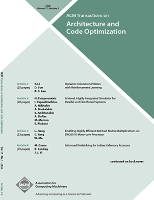
ACM Transactions on Architecture and Code Optimization
Scope & Guideline
Fostering Excellence in Hardware and Software Research
Introduction
Aims and Scopes
- Computer Architecture Innovations:
The journal emphasizes research that explores novel architectural designs, including hardware accelerators, memory systems, and heterogeneous computing environments. - Code Optimization Techniques:
Research focusing on methodologies for optimizing code performance, including compiler optimizations, runtime adaptations, and algorithmic enhancements. - Performance Modeling and Analysis:
Studies that involve performance modeling, benchmarking, and analytical techniques to evaluate and predict the behavior of systems under various workloads. - Energy-Efficient Computing:
Contributions that address energy efficiency in computing systems, highlighting techniques for power management, low-power design, and energy-aware architectures. - Reliability and Security in Computing Systems:
Research that investigates reliability issues, fault tolerance, and security vulnerabilities in architectures and code, proposing solutions to enhance system robustness. - Applications of Emerging Technologies:
Exploration of how emerging technologies such as quantum computing, neuromorphic computing, and machine learning can be integrated into architectural designs.
Trending and Emerging
- Heterogeneous Computing Architectures:
There is a growing focus on architectures that integrate various processing units, such as CPUs, GPUs, and FPGAs, to enhance performance for diverse workloads. - Machine Learning and AI Accelerators:
Research on dedicated hardware and optimization techniques for machine learning algorithms, particularly deep learning, is rapidly increasing, indicating a trend towards AI-centric architectures. - Near-Memory and In-Memory Computing:
Emerging studies on near-memory computing paradigms that reduce data movement and enhance performance for memory-intensive applications are gaining prominence. - Quantum Computing Architectures:
With advancements in quantum technologies, research into quantum computing architectures and their optimization is becoming increasingly significant within the journal. - Energy-efficient Machine Learning:
The journal is seeing a rise in papers focusing on energy-efficient approaches to machine learning, particularly for deployment in resource-constrained environments such as edge computing.
Declining or Waning
- Traditional Memory Management Techniques:
Research on conventional memory management strategies has decreased as newer approaches focusing on near-memory computing and heterogeneous architectures gain traction. - General-purpose Processor Optimization:
There is a waning interest in optimizing traditional general-purpose processors as the focus shifts towards specialized accelerators and domain-specific architectures. - Static Analysis for Performance Tuning:
Static analysis methods for performance tuning are becoming less frequent as dynamic and adaptive methods are preferred for their flexibility and real-time applicability. - Software-based Fault Tolerance:
Studies emphasizing software-based approaches to fault tolerance are declining as hardware solutions and architectural innovations are prioritized for reliability. - Single-core Optimization Methods:
Research focusing on optimizations for single-core processors is diminishing, with a greater emphasis on multi-core and many-core systems to leverage parallelism.
Similar Journals

DESIGN AUTOMATION FOR EMBEDDED SYSTEMS
Transforming Ideas into Automated SolutionsDESIGN AUTOMATION FOR EMBEDDED SYSTEMS, published by Springer, is an esteemed journal focusing on the advancements in the design automation of embedded systems. With an ISSN of 0929-5585 and an E-ISSN of 1572-8080, this journal has made significant contributions to the fields of Hardware and Architecture and Software, as reflected in its Q3 ranking within the respective categories. Since its inception in 1996 and continuing through its ongoing publications until 2024, DESIGN AUTOMATION FOR EMBEDDED SYSTEMS provides a vital platform for researchers, professionals, and students to disseminate innovative research findings, methodologies, and technological developments. Although it does not currently offer open access options, its rigorous peer-review process ensures only the most impactful studies shape the future of embedded systems design. This journal is essential for anyone looking to stay at the forefront of research and development in embedded systems design and automation.

Journal of Grid Computing
Unveiling Insights in Software and Information SystemsThe Journal of Grid Computing, published by Springer, stands as a pivotal resource in the dynamic field of computer science, particularly within the realms of Computer Networks and Communications, Hardware and Architecture, Information Systems, and Software. With an impressive Q1 ranking across these categories in 2023, the journal exemplifies excellence and rigor, catering to a diverse readership from researchers to industry professionals. Established in 2003, this esteemed journal is anchored in the Netherlands and releases cutting-edge research that reflects trends and advancements in grid computing technologies. Researchers can gain insights through its vast contributions, while institutions benefit from its prestigious standing within the SCOPUS framework, boasting high percentile ranks in multiple computer science categories. Though not open access, the journal provides unparalleled access options for institutional subscribers, solidifying its importance as a gateway to innovative discoveries in high-performance distributed computing.
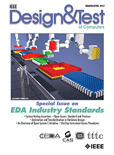
IEEE Design & Test
Shaping the Future of Design and TestingIEEE Design & Test is a leading academic journal published by the IEEE-INST ELECTRICAL ELECTRONICS ENGINEERS INC, dedicated to advancing the fields of Electrical and Electronic Engineering, Hardware and Architecture, and Software. With an ISSN of 2168-2356 and an E-ISSN of 2168-2364, the journal spans from 2013 to 2024, offering valuable insights and peer-reviewed research that addresses critical challenges in the design, verification, and testing of electronic systems. Recognized for its quality, the journal holds a Q2 designation in Electrical and Electronic Engineering and ranks within the top quartiles of its category, making it a notable resource for professionals and scholars alike. Its Scopus rankings, particularly a rank of #354 in Electrical and Electronic Engineering, underscores its significance and relevance in the rapidly evolving technological landscape. Although not currently open access, the journal remains committed to disseminating innovative research that shapes the future of technology, ensuring that researchers and practitioners stay at the forefront of their disciplines. IEEE Design & Test serves as an essential platform for exchanging ideas, fostering collaboration, and driving advancements in engineering and computer science.

JOURNAL OF SUPERCOMPUTING
Pioneering Insights in High-Performance ComputingJOURNAL OF SUPERCOMPUTING is a premier academic journal published by SPRINGER, situated in the Netherlands, that has made significant contributions to the fields of computer science, particularly in hardware and architecture, information systems, software, and theoretical computer science. With a robust publication history spanning from 1987 to 2024, this journal has cultivated a strong reputation, evidenced by its Category Quartiles ranking in the Q2 category across multiple relevant domains in 2023. The journal's Scopus rankings further underscore its influence, boasting a 78th percentile in mathematics and theoretical computer science, revealing the high quality of research disseminated within its pages. As vital discourse unfolds in the realm of supercomputing—where innovative techniques and technologies rapidly evolve—this journal serves as a crucial platform for researchers, professionals, and students to explore cutting-edge studies and build upon the foundations of knowledge in this dynamic field.
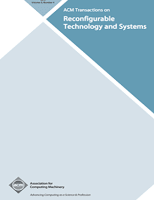
ACM Transactions on Reconfigurable Technology and Systems
Catalyzing Change in Reconfigurable Technology and SystemsACM Transactions on Reconfigurable Technology and Systems is a leading journal in the field of computer science, specifically focusing on the rapidly evolving area of reconfigurable technology. Published by the esteemed Association for Computing Machinery, this journal provides a vital platform for researchers and practitioners to share groundbreaking findings and innovative methodologies that drive advancements in system design, architecture, and implementation. The journal boasts a commendable impact factor and has positioned itself within the top quartile (Q1) of computer science journals as of 2023, with a notable Scopus rank of #64 out of 232 in the General Computer Science category, placing it in the 72nd percentile. As a trusted resource for the latest developments from 2008 to 2024, the journal encourages submissions that challenge conventional approaches and propose novel solutions in reconfigurable technologies. Although it is not open access, it continues to strive for accessibility and dissemination of knowledge that is critical for academics, industry professionals, and students alike.
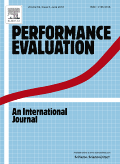
PERFORMANCE EVALUATION
Empowering Scholars with Cutting-Edge Evaluative InsightsPERFORMANCE EVALUATION, published by ELSEVIER, is a prestigious journal that serves as a critical resource for researchers and professionals in the fields of Computer Networks and Communications, Hardware and Architecture, Modeling and Simulation, and Software. With its ISSN 0166-5316 and E-ISSN 1872-745X, this journal is recognized for its contribution to the advancement of performance assessment methodologies and empirical research. Holding a Q3 quartile ranking across multiple categories in 2023, PERFORMANCE EVALUATION is positioned as a valuable platform for disseminating high-quality studies that explore complex performance issues and innovative solutions. Operating from its base in the Netherlands, this journal emphasizes rigorous peer-review standards and enhances its relevance within the academic community by addressing crucial challenges and trends in technology. Stakeholders can access the wealth of knowledge published from 1981 through 2024 by exploring this journal, making it an essential tool for practitioners and scholars aiming to stay at the forefront of computer science research.
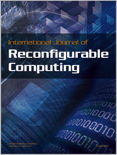
International Journal of Reconfigurable Computing
Fostering Collaboration in Next-Gen Computing ResearchWelcome to the International Journal of Reconfigurable Computing, a leading open-access platform dedicated to the exploration of innovative methodologies and applications in the field of reconfigurable computing. Published by HINDAWI LTD, this journal has been fostering scholarly communication since its inception in 2008. With an ISSN of 1687-7195 and an E-ISSN of 1687-7209, it offers researchers valuable access to the latest advancements and trending research in hardware and architecture, evidenced by its quarterly ranking in the Q4 category for 2023. Researchers, professionals, and students alike will find this journal an invaluable resource for staying updated in a rapidly evolving domain, notwithstanding its current Scopus ranking of 154 out of 177 within its category, reflecting a burgeoning opportunity for growth and engagement in this niche. Submitting their research to the International Journal of Reconfigurable Computing not only connects authors with a global audience but also contributes to the collective advancement of knowledge in this critical area. Explore the vast potential of reconfigurable systems and become part of a community dedicated to pushing the boundaries of computing technology.
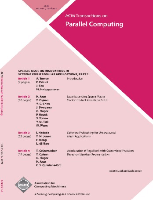
ACM Transactions on Parallel Computing
Transforming Theories into TechnologiesACM Transactions on Parallel Computing (ISSN: 2329-4949; E-ISSN: 2329-4957), published by the Association for Computing Machinery, stands as a pivotal journal in the field of computer science, particularly focusing on the advancements in parallel and distributed computing. With its convergence years spanning from 2014 to 2024, this journal serves as a significant platform for disseminating cutting-edge research, methodologies, and technologies that shape the future of computational theory, hardware architectures, and effective software solutions. Although it currently holds a Q3 category ranking in various subfields including Computational Theory and Mathematics, and Modeling and Simulation, it continues to attract researchers aiming to contribute to its growing impact in the field. The journal's commitment to fostering knowledge exchange makes it an essential resource for professionals and students eager to navigate the complexities of parallel computing. As the field evolves, ACM Transactions on Parallel Computing remains a critical reference point for innovative research and professional development in computer science.
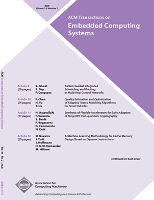
ACM Transactions on Embedded Computing Systems
Elevating knowledge in embedded systems for a digital future.ACM Transactions on Embedded Computing Systems (ISSN: 1539-9087, E-ISSN: 1558-3465), published by the Association for Computing Machinery, is a premier academic journal dedicated to advancing the study and application of embedded computing systems. With a focus on both hardware and software aspects, this journal holds a distinguished Q2 ranking in its field (2023) and has achieved notable recognition within Scopus rankings, particularly in Hardware and Architecture (Rank #97/177) and Software (Rank #231/407). Encompassing research from 2002 to 2024, it serves as a crucial platform for disseminating cutting-edge findings that drive innovation and foster scholarly dialogue among researchers, professionals, and students alike. Although it does not offer open access options, the journal remains essential for those seeking to deepen their understanding of the complexities of embedded systems, contributing significantly to the growth of knowledge across disciplines.
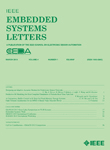
IEEE Embedded Systems Letters
Fostering Collaboration in Embedded Systems Engineering.IEEE Embedded Systems Letters is a prominent scholarly journal dedicated to advancing the field of embedded systems engineering, published by the IEEE - Institute of Electrical and Electronics Engineers. Since its inception in 2009, this journal has become an essential resource for researchers, practitioners, and students, offering a platform for the dissemination of innovative research and technological advancements in embedded systems. With an esteemed Q2 ranking in both Computer Science (miscellaneous) and Control and Systems Engineering, it ranks within the top half of the field, reflecting its impact and relevance. The journal covers a wide array of topics, including hardware-software co-design, real-time systems, and system-on-chip architectures, making it an invaluable reference for those engaged in the development of cutting-edge technologies. Subscribers benefit from exclusive access to rigorously vetted articles, conference reports, and reviews, contributing to the vibrant dialogue within the embedded systems community. With its commitment to excellence, IEEE Embedded Systems Letters serves as a critical avenue for fostering collaboration and innovation in this rapidly evolving domain.